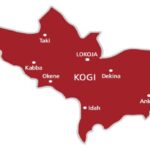After effectively overrunning Mainok village, the attacking insurgents left in a joyous mood, leaving behind for the survivors, painful memories of death and loss. Sadly, when the incident occurred on Saturday, 1st March, 2014, little was told of the harrowing experience of the people of Mainok, probably owing to their travails’ coinciding with those of Maiduguri, the state’s capital, which left scores dead.
Situated some 55 kilometers west of Maiduguri, Mainok was hitherto a preferred location for travelers and prominent people who normally stopped by to have a taste of its famous watermelon, and to buys some as souvenirs. At the time of peace, locals in the area who cultivate the fruit had a viable means of trade.
That is now history and with the exception of the Central Mosque in the village, nothing is standing, leaving the area as cold and empty as a graveyard.
The true situation in Mainok came to the fore when Governor Kashim Shettima, in the company of many commissioners, special advisers and other senior aides visited the ravaged community on Thursday.
All the stalls and sheds once occupied by youthful sellers of watermelons have been deserted and only heaps of rotten fruit dotted the area.
Women, children and aged villagers in tattered clothes, looking visibly traumatized, resurfaced from nearby villages when they heard sirens from vehicles conveying heavily-armed troops that led the convoy of Governor Shettima, who remains resolute in visiting any community that is attacked.
The whole village was a sorry sight as almost all homes, business premises, market and even the Village Square were all gone. The primary school in the community, which was being rebuilt after a previous attack by the insurgents, was also not spared.
The villagers said when the insurgents stormed it was like a day of reckoning to them, narrating how they were terrified by gunshots and petrol bombs, thrown into buildings by the attackers. Mustapha Amin, 41, said when the attack began, most of the survivors fled without picking anything from their homes.
“It was already dark when the attackers came. Some of us were in front of the mosque while others were chatting by the highway. We suddenly heard gunshots and everybody ran away, not aware of what would happen to our families. Most of us slept in the bushes,” Amin told Weekly Trust.
While briefing Governor Shettima on their travails, some of the community leaders said since the attack, nobody sleeps in Mainok because they are afraid of the unknown. “There is no life in Mainok at all. Everything is gone: our grains in the stores, our animals, our shops, our sources of water were all destroyed by the attackers,” Goni Adam, one of the leaders said.
Umaru Musa, a youth leader in the area, said after they fled, the insurgents had a field day. He however noticed something unusual: “Much later, at night while [the insurgents] were still sacking the village, an aircraft hovered in the sky.” He said they only returned to the village because they heard that the governor was there. “His coming inspired us to return,” he said.
Mansur Buba, a local, told Weekly Trust that the insurgents launched the attack a few hours after the Maiduguri mayhem began, indicating a pattern. “We were pondering the incidents in Maiduguri when the gunshots began, heralding the attacks on our village,” he said, adding that they counted about 39 bodies after the tragic event.
Speaking to them in Kanuri language, Governor Shettima said he shares their pain and will remain with them, in prayer and in doing everything to find a solution to the senseless killings. “No amount of money can compensate life. We will help those who lost their loved ones or property. We will give you what to eat, rebuild all your houses, including the market and we will also improve the security in your village. This is our land, we are not going anywhere,” he said.
Though regularly advised not to visit some attacked communities because of security concerns, Shettima said he can’t afford to stay in the Government House when citizens are in distress. “I have to visit survivors and commiserate with them because we have a responsibility to protect them and give them a sense of belonging,” he said.
The ugly scenario in Mainok is just a reflection of the trauma being experienced by people in other towns and villages such as Jakana, Benisheik, Konduga, Kawuri, Bama, Gwoza, Damboa, Mafa and others. Most of the places mentioned above are now a shadow of what they were, and efforts by the Borno State government to resettle the distraught survivors are taking a heavy toll on the purse of the state government.
Between January and the time of filing this report, nearby 500 people have been killed by Boko Haram terrorists who attacked villages and towns. Military authorities in Maiduguri have stopped talking to newsmen but in Abuja, they say they are on top of the situation. However, some middle-level officers and men that confront the insurgents have said in private discussions that they need more focused logistics if they are to fight successfully.
“We can outwit the terrorists if we have the right equipment, because we have the requisite training and determination to succeed,” an officer who participated in the repelling the recent attack in Jakana said.
The Information Officer of the National Emergency Management Agency (NEMA) in the North-East, Abdulkadir Ibrahim, said they have so far registered 55,000 internally displaced persons and are still counting. Recounting the violence committed by insurgents in the region in the past few weeks tells the story of an endangered generation.
mainok: ravaged by terror, forgotten by the media
After effectively overrunning Mainok village, the attacking insurgents left in a joyous mood, leaving behind for the survivors, painful memories of death and loss. Sadly,…



